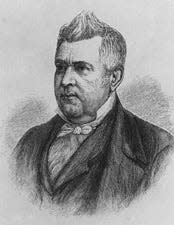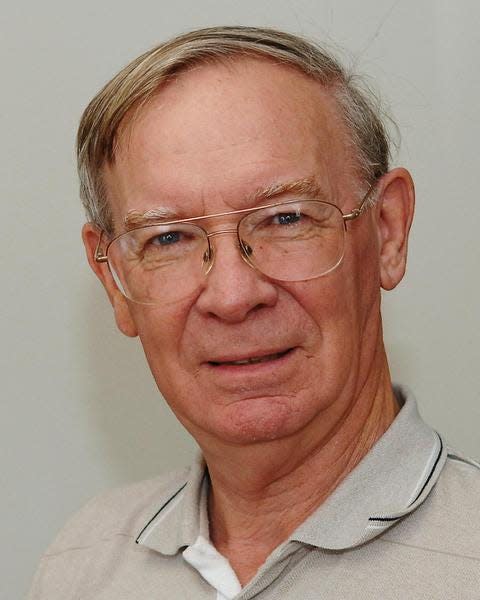'The storm of civil war' was predicted by Delaware Sen. John Clayton
- Oops!Something went wrong.Please try again later.
- Oops!Something went wrong.Please try again later.
- Oops!Something went wrong.Please try again later.
John Middleton Clayton, tall, handsome and the youngest member of the United States Senate, rose to speak on March 4, 1830.
A dispute over the sale of public lands exploded in a series of speeches by Robert Y. Hayne of South Carolina and Daniel Webster of Massachusetts on the nature of the Federal Union. In a day when speeches lasted hours and touched on many topics, Hayne was strident in his defense of state’s rights, the South Carolina Doctrine of nullification and slavery.
When it came to fugitive slaves and the abolitionists, Hayne sarcastically commented, “What a commentary on the wisdom, justice and humanity of the Southern slave owner is presented by the example of certain benevolent [abolitionist] associations and charitable individuals elsewhere. Shedding weak tears over sufferings which had existence only in their own sickly imaginations, these ‘friends of humanity’ set themselves systematically to work to seduce the slaves of the South from their masters.”

Webster answered Hayne, and his eloquence soared to end in a phrase that was repeated in Northern schoolhouses for a generation: "Liberty and Union, now and forever, one and inseparable!” The Hayne-Webster debate was one of the most important American political debates of the early republic. The speeches were printed in the newspapers across the young country.
Several weeks after the Hayne-Webster debate, young Delaware Sen. Clayton rose to speak. Born in Dagsboro in 1796, Clayton attended school at Lewes and then went to Yale, where he graduated in 1815 with the highest honors.
With his formal education over, Clayton returned home to southern Delaware, and in 1819, he was admitted to the bar at Georgetown. The young lawyer’s sharp gray eyes and dark eyebrows, which contrasted with his prematurely white hair, helped make him an imposing figure in the Georgetown courtroom where he argued his cases eloquently and successfully. In 1828, Clayton was elected to the United States Senate.
Although Delaware was a slave state, and Southern in many of its leanings, Clayton was opposed to the doctrine of nullification, and he was no friend of slavery. In his speech, Clayton attacked the heart of the South Carolina nullification doctrine, which the Delaware senator believed would lead to a civil war over slavery.
Clayton described the horrors of the war to come: “The storm of civil war will howl fearfully through the land, from the Atlantic border to the wildest recesses of the West, covering with desolation every field which has been crowned with verdure by the culture of freemen, and now resounding with the echoes of our happiness and industry.”
Along with the texts of speeches of Hayne and Webster, Clayton’s address was one of the most widely circulated of the debate. Clayton’s speech marked him as a rising star on the political scene, and he would be a force in Delaware politics for a generation.
MORE:A plane that would hop across Atlantic Ocean? The wild idea almost took flight in Lewes
MORE:When an epic department store battle broke out in Lewes, it was all about deep discounts
Clayton eventually served as secretary of state under President Zachary Taylor, and the Dagsboro native negotiated a treaty that paved the way for the Panama Canal. The questions of nullification, secession and slavery, however, continued to fester for another three decades.
After the election of Abraham Lincoln in 1860, South Carolina announced that it had seceded from the Union, and sparked the Civil War. Clayton’s tragic prophecy that, “The storm of civil war will howl fearfully through the land, from the Atlantic border to the wildest recesses of the West,” had been unfortunately fulfilled.

Principal sources
The Webster-Hayne Debates, “Speech of Senator Robert Y. Hayne of South Carolina, January 25, 1830;” “Speech of Senator Daniel Webster of Massachusetts, January 26 and 27, 1830.” https://teachingamericanhistory.org/document/the-webster-hayne-debates/
Obituary Addresses on the Occasion of the Death of the Hon. John M. Clayton of Delaware, Washington: A. G. P. Nicholson, Public Printer, 1857, p. 9.
Herman Belz, ed., The Webster-Hayne Debate on the Nature of the Union, Indianapolis: Liberty fund 2000, p. 407
This article originally appeared on Salisbury Daily Times: Delaware Sen. John Clayton predicted 'the storm of civil war'
